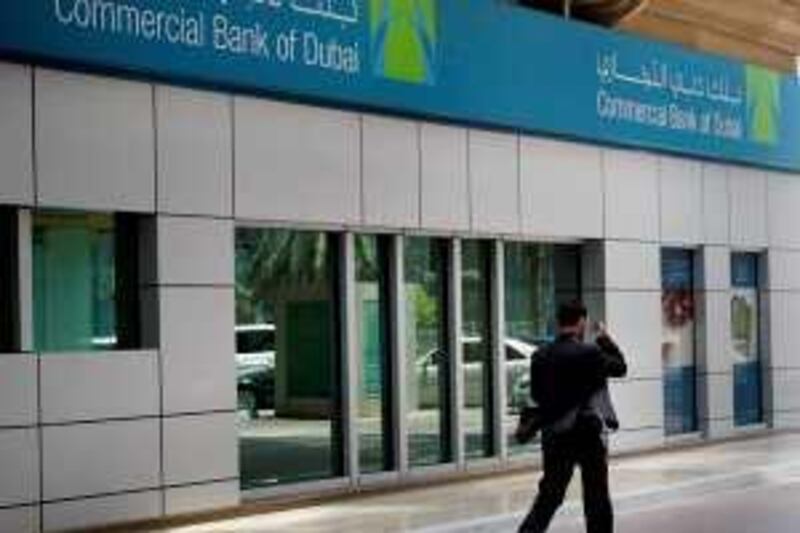The credit ratings of seven lenders in Dubai, Sharjah and Ras al Khaimah were downgraded on Thursday by Fitch, as the ratings agency expressed doubts over future UAE support. The move was triggered by concerns over the ability of the Government and the emirate of Dubai to provide assistance to their banks even though their "willingness" to do so was undiminished. The downgrade covered Bank of Sharjah, Commercial Bank of Dubai, Dubai Bank, Emirates Bank International, Mashreqbank, National Bank of Ras al Khaimah and Tamweel, the home-finance company.Fitch said the downgrades reflected increasing stress on the Government of Dubai and the Central Bank as they try to finance the restructuring of roughly US$65 billion (Dh238.74bn) in debts owed by Dubai-controlled companies such as Dubai World. "It's the imminent increase in Dubai Government liabilities and the prospect of further increases being required at a time when Dubai Government revenues are unlikely to be growing and indeed are likely to be under pressure because of the domestic recession," said Richard Fox, the head of sovereign ratings at Fitch in London. Dubai revealed last November that it had roughly $10bn in sovereign debt, then doubled its debt load in February when it sold $10bn in bonds to the Central Bank. That money was used to help Dubai Government-controlled companies such as Nakheel pay contractors and creditors in the wake of a sharp economic downturn that saw property prices fall by as much as half since their peak. The remainder of the funds are now being managed by the Dubai Financial Support Fund, which was created in July to oversee Dubai Inc's restructuring. When it announced the new fund, Dubai also confirmed plans to sell an additional $10bn in bonds by the end of this year, leaving it with triple the amount of debt it owed at the end of last year. Some economists have questioned Fitch's concerns over the structures in place to help support local lenders.They say ratings agencies have tended to pay too much attention to clear support structures at the expense of clear actions. "Ratings agencies always look for a set framework that governs how federal authorities and the Central Bank support banks," said Mahdi Mattar, the chief economist at Shuaa Capital. "We don't have such a framework or any clear procedures here in the UAE, but the government has repeatedly shown its willingness and ability to support its banks. Investors know very well that the Federal Government would not allow any of its commercial banks to fail." The downgrades also appear to run counter to a resurgence in investor confidence in local debt and equity markets in recent weeks. Dubai Government bonds have been rising steadily since last month while prices of credit default swaps, or the cost of insuring against default, for Dubai and Abu Dhabi sovereign paper have dropped to their lowest levels this year. However, the Dubai Government, and companies it controls, is still estimated to be carrying $85bn in outstanding debt, $6.8bn of which is due for payment by the end of the year. About $4.05bn of that represents the principal and profit payments owed by Nakheel. The Central Bank's loan to Dubai has cut into its own foreign exchange reserves, Mr Fox said. Analysts at the time suggested that the loans were denominated in US dollars so that they could still be counted as foreign--exchange reserves. But because the bonds are domestic, they cannot be counted as foreign-exchange reserves. With what analysts say is an estimated $24bn in remaining reserves, the Central Bank may not be able to afford to buy Dubai's next $10bn in bonds without leaving its own reserves depleted. Many bankers and executives in the UAE have long assumed the Central Bank could count on support from Abu Dhabi if it needs it. But there is no explicit mechanism for transfers from Abu Dhabi to the Central Bank. Until there is some clear statement of support from Abu Dhabi for such federal financing, Mr Fox said, Fitch could not include implicit support in its ratings for the UAE or for Dubai. The downgrades follow a regular annual review of Abu Dhabi's sovereign rating by Fitch last week, when it reaffirmed its "AA" rating for Abu Dhabi's foreign-currency debt. Neither the Government nor Dubai have sovereign ratings. "We felt it is no longer correct to treat obligations of the UAE sovereign and of Abu Dhabi in the same way," said Robert Thursfield, who heads financial institutions at Fitch in Dubai. The ratings agency also warned that Abu Dhabi-linked companies may need sovereign help to service their debt obligations as state-owned companies alone raised $18bn in external bonds and loans so far this year. In a separate move, Fitch also downgraded Dubai's utility Dubai Electricity and Water Authority and Dubai Holding Commercial Operations Group, a Dubai-based real-estate developer and hotel operator. As well, it placed Etisalat, the national telephone company, on review for a possible downgrade. It cited Dubai's weaker credit profile and uncertainty about "how any government support may be provided". uharnischfeger@thenational.ae warnold@thenational.ae
Fitch downgrades seven UAE banks
Action taken on concerns that the UAE and Dubai may be unable to provide future support.

Editor's picks
More from the national




